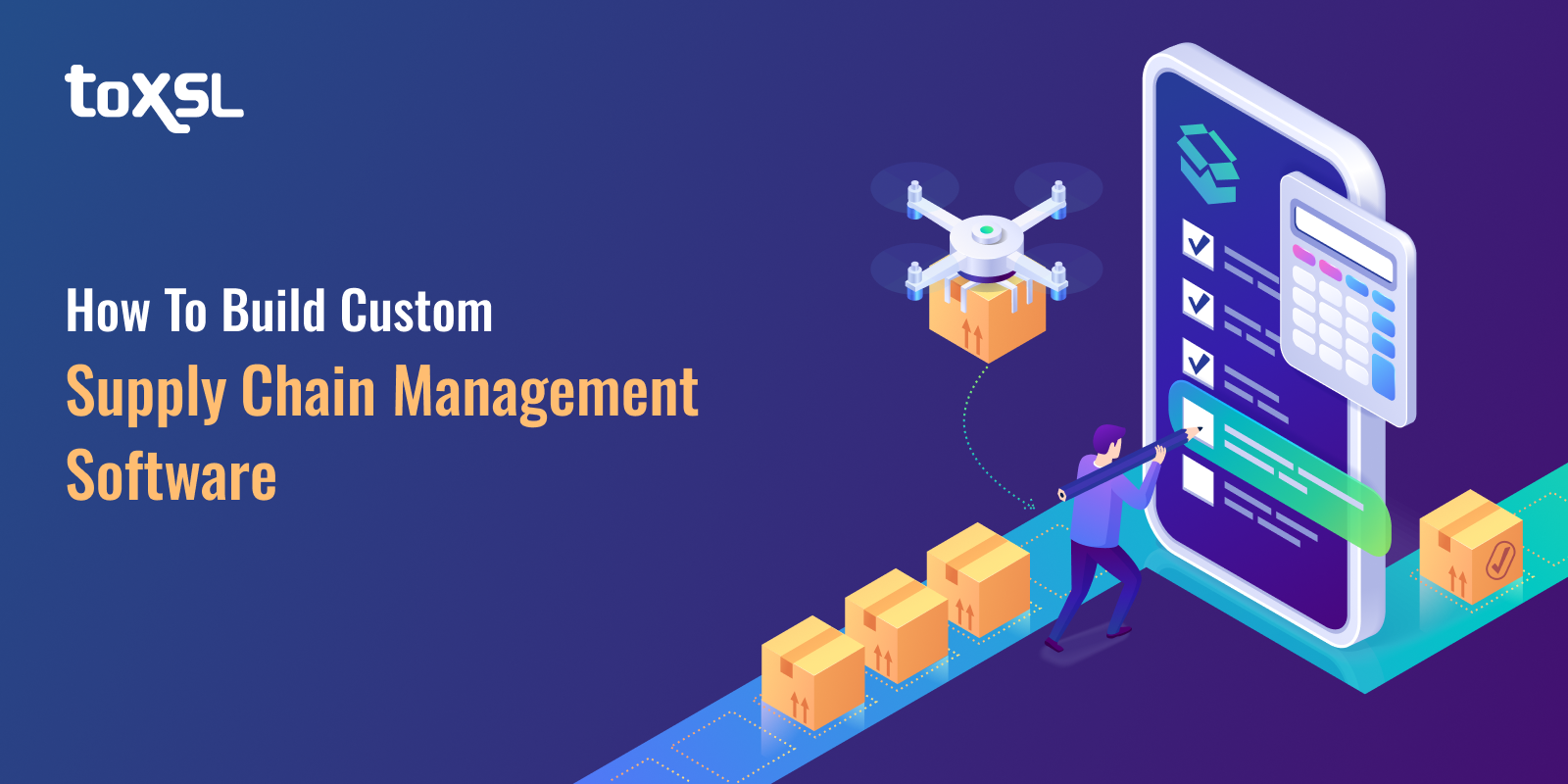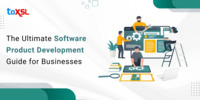- Dec 12, 2024
- Software Development
- 2501
Share this post on:

Today, businesses around the globe are using fully or partially digitized custom supply chain management software to manage their supply chain. According to Statista, the supply chain management software market is estimated to reach US $20.07 billion by the end of 2025. Also, by 2029, the market is predicted to reach US $24.58 billion at a CAGR of 4.14%.
Supply chain management involves the entire process of planning, implementing, and controlling the supply chain operations. It is a challenging task and requires numerous variables, and a business’ success heavily depends on supply chain management. The supply chain management software tracks and manages crucial business operations, including purchasing, acquiring services, and outsourcing, among others. The main purpose is to enhance operational efficiency and eliminate unnecessary resource consumption of businesses.
Supply Chain Management Process
Managing a supply chain involves various stages. The following are the stages involved in supply chain management:
Planning: This stage involves predicting future demands and developing a strategy for every department, including sourcing materials, staff scheduling, transportation, and more. Before planning, ensure that you have done proper market research and have analytics to make accurate forecasts.
Procurement: Procurement means buying the right amount of the right materials for the best price. It also involves picking suppliers and keeping good business relationships with them.
Manufacturing: It is a process of changing raw materials into finished products with the help of people, machines, and sometimes other things. Some businesses, like eCommerce or retail, don’t have this step in their supply chain because they sell ready-made goods or services.
Distribution and logistics: Distribution and logistics is a process of finding customers, making sales, organizing storage and transportation, and delivering products. It also includes handling returns when customers send items back.
Inventory management: Inventory management is about keeping track of the types and amounts of stock you have in your supply chain.
Analytics: Analytics is a tool that connects all parts of the supply chain. It helps monitor how well things are working, find various ways to improve, and make better decisions.
How To Develop A Supply Chain Management System?
Want to develop a supply chain management system that fits your business needs? In this section, we will help you learn how to develop a supply chain management system:
Gather Requirements: Once you understood the concept of supply chain management, start by looking for your business requirements. Determine your goals for project development and look for the stakeholders. Before making any decision, ensure to ask for the questions such as:
• What features do you want in your SCM system?
• In which tech stack do you want to develop your SCM system?
• What are the required tool sets for the development of an SCM system?
After communicating with your stakeholders, business must start with preparing project requirements and putting them in documents, responding to why business needs supply chain management (SCM).
Skilled Developers: Do you want to develop an efficient SCM quickly? If yes, then outsourcing the development team who can develop the best supply chain management is an essential tool for the business. So, it is necessary for you to search for the best software development vendor you can collaborate with. The software development company takes full responsibility for your SCM project and ensures on-time delivery. They ensure to conduct proper business research, look for the gaps in the market, and take care of numerous other requirements.
Solution Type: So, have you decided whether you want an off-the-shelf solution or a customized one? Well, both solution types have their own advantages and disadvantages. For example, if you want cost-effective SCM software as fast as possible, you can choose an off-the-shelf type. However, if you are looking for the customized features and want to develop supply chain software that is suitable for your business platform, you can choose a customized solution.
In terms of money, a customized supply chain management solution will be costlier than off-the-shelf software, as customized software is designed according to your business needs.
Project Development: Once you have decided on the solution type for your business, you can start with the development part. Ensure that you choose the leading software development company, such as ToXSL Technologies, for the development of the software. An experienced software company will offer the best solutions as they have years of experience, know the challenges businesses face in the market, and have solutions for particular issues in the most beneficial way possible. Also, an IT software solution provider will help you define a supply chain management process that will help you generate a better solution for your business. They also take responsibility for the design and development of the app.
Customer Support: What if an error comes after the launch? Hence, after the launch of the software, the IT services providers are responsible for offering maintenance and customer support to the businesses worldwide. So, ensure that the team you are hiring for the software development offers 24x7 customer support and resolves the issues as fast as possible.
How Much Does It Cost To Develop A Supply Chain Management System?
The cost to develop a supply chain management system is not fixed. The cost of development usually depends on various features and functions and ranges from $10,000 to $150,000. Also, the cost is also determined by the experience of the team. If you are hiring a highly experienced team, then the cost might be higher, but the time of development will be less. On the other hand, if you develop a supply chain system with the help of a less experienced team, the cost might be lower, but the time will be longer. So, if you want to know the exact price, you can contact the shortlisted software development teams.
Benefits of Supply Chain Management
We have already discussed the development and the cost involved in the development of the supply chain management system. Let us now dive deeper into the blog and discover the benefits of supply chain management.
Cost-efficiency: One of the benefits of supply chain management is cost-efficiency. With the help of a supply chain management system, companies can minimize operating costs by reacting rapidly to customers queries. These systems help businesses avoid overproducing, saving money on personnel resources, inventory control, and more.
Material Movement: The supply chain system works to reduce the time it takes to develop a product and deliver it to the customer. Deliveries are made quickly, needing many components to perform at their peak level.
Enhanced Communication: Supply chain management systems offer seamless data sharing and give businesses a clear picture of what is happening in various supply chain sections. Hence, these systems enhance communication and make better working relationships with suppliers and vendors.
Enhanced Dispatch: These systems help you eliminate various distribution routes and help you enlist the logistics professionals. Also, SCM allows businesses to preserve more cash flow and enhance the profitability of the business.
Risk Reduction: A proper SCM system is crucial for logistic businesses as it helps in finding issues in particular SCM as soon as possible. It analyzes the given information and helps business owners to develop a plan that helps prevent issues in the SCM system and lower the expenditure.
Higher Incomes: SCM monitors every chain section the item passes from the end customers. They use data and help businesses grow their income and bottom line.
Conclusion
ToXSL Technologies is a leading supply chain management solution development company. With more than 12 years in business, we have successfully helped our clients by offering them the best supply chain management solution. Our team of skilled developers has hands-on experience building SCM, ERP, and CRM, among others. We help businesses reduce operating costs, optimize supply chains, and streamline storage. At ToXSL Technologies, we first gather all the required needs of the clients. With that, we then sign a non-disclosure agreement (NDA), and then we start working on the solution.
So, if you are looking to hire the best supply chain management solution development company, look no further than ToXSL Technologies. Get in touch with our team today and learn how we can help you transform business.
FAQs
1. What features should businesses include in my custom SCM software?
Key features to consider when developing custom SCM software include:
- Inventory Management: Real-time tracking of stock levels across multiple locations.
- Order Processing: Automation of order fulfillment and invoicing.
- Analytics and Reporting: Advanced analytics for data-driven decision-making.
- Supplier Management: Tools for managing supplier relationships and performance.
- Notifications: Alerts for stock levels, order status, and critical updates.
2. How long does it take to develop custom SCM software?
The development timeline for custom SCM software can vary significantly based on complexity and specific requirements. Simple systems may take a few months, while more complex solutions could take several months to over a year. It is essential to establish a clear project roadmap with milestones to ensure timely delivery.
3. What is the cost associated with building custom SCM software?
Costs for developing custom SCM software depend on various factors, including the development team’s expertise, project complexity, and geographical location. Budgeting should include costs for design, development, testing, and ongoing maintenance. Consulting with experts can help clarify potential expenses and ensure alignment with business goals.
4. Do I need technical expertise to build custom SCM software?
While technical expertise can be beneficial, many modern platforms allow users without coding experience to create custom SCM systems using intuitive interfaces and drag-and-drop features. Tools like Five enable rapid setup and customization without extensive programming knowledge, making it accessible for various users.
5. Types of Supply Chain Management Software
- Inventory Management Software (IMS): Maintains right inventory levels by tracking and managing stock, automating ordering, and forecasting demand.
- Warehouse Management Software (WMS): Organizes storage, picking, packing, and shipping in warehouses, reducing waste and improving efficiency.
- Transportation Management Software (TMS): Plans and monitors shipments, chooses carriers for dependable and affordable transportation, and optimizes delivery routes.
- Supplier Relationship Management Software (SRM): Improves communication with suppliers, automates orders, and tracks contracts and supplier performance.
- Demand Planning Software (DPS): Forecasts customer needs to optimize stock, production schedules, and reduce storage costs.
- Enterprise Resource Planning (ERP): Combines all business functions, like inventory, finances, and HR, into one system for better decision-making and streamlined operations.









